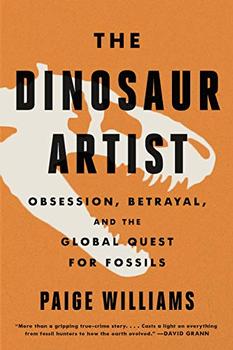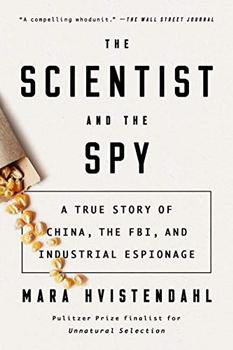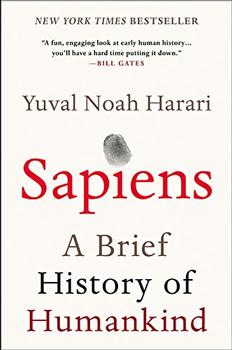Summary | Excerpt | Reviews | Beyond the book | Read-Alikes | Genres & Themes | Author Bio

Obsession, Betrayal, and the Quest for Earth's Ultimate Trophy
by Paige WilliamsWho isn't fascinated by dinosaur fossils? Award-winning New Yorker staff writer Paige Williams' nonfiction debut, which might alternatively be titled Dinosaur Wars, makes a dynamite case that the people who hunt and/or collect fossils are equally intriguing. In this exhaustively researched and heavily annotated but enthralling book, she states, "Fossil enthusiasts are as obsessed a segment of natural history lovers as ever existed." She goes on to quote paleontologist Mark Norell of the American Museum of Natural History: "'I have been in people's houses where every possible inch of their home is covered in fossils...Even the dishwasher has trilobites in it.'"
What is the motivation behind fossil hunting? Is it their age? Many dinosaur fossils are over 200 million years old. Is it because they are so rare and hard to find? Some estimate that the remains of less than one percent of all animal species that have existed on this planet have become fossils. Is it because they give scientists clues to the origins of different types of life that long preceded recorded history? Every new species identified contributes to the compendium of natural history knowledge. Or is it because the fossil business can be very lucrative? In 1997 a Tyrannosaurus Rex skeleton nicknamed "Sue" was auctioned for a whopping $8.36 million. As Ms. Williams notes, fossil aficionados can generally be divided into three categories, "paleontologists, collectors, and commercial hunters." A collector's personal inclination depends on which of these groups they fall into.
The eponymous dinosaur artist, 38-year-old Eric Prokopi, is the hapless protagonist in a story with roots that crisscross the planet and date back to the 12th century. Williams brings him into our ken as a father, husband and fossil hunter on a precipice. He believes that his prehistoric ship is about to come in, as a big time auction house is set to sell one of his greatest fossil hunting finds for a potential seven figures, fixing his always-precarious financial situation. Instead, he watches helplessly as the motivations of the three fossil-loving groups collide. After the resulting clash, Prokopi finds himself behind bars. His personal history and humanity make him a tragic hero, as he becomes the victim of an intersection between geopolitics, capitalism and nationalist fervor.
Prokopi began diving for primordial trophies in the rivers of his native Florida as a boy in the 1990s. He went on to work as a cataloger for the Florida Museum of Natural History before setting his sights on the high-priced fossil auctions, purchasing a partial dinosaur skull (which had been unearthed in Mongolia) in 2006 and selling it for a tidy profit (to actor Nicholas Cage). When Prokopi later traveled to Mongolia on a mission to unearth and import more fossils, however, he found himself charged with smuggling. Up until as recently as the late 20th century many countries had no or very lax legislation governing the collecting and trafficking of fossils. After all, there was little money in it compared to, say, fossil fuels or precious gems. Even the United States' laws were and still largely are sketchy at best, adhering to private property ownership preeminence. Thus Prokopi could fairly reasonably plead ignorance regarding the legal issues.
Williams steps back from Prokopi's story to provide illuminating historical context on paleontology and fossil hunting. She profiles significant players in the fossil business, which began turning major profits about the mid-20th century as the public's interest in paleontological discoveries began to escalate. Her characterizations expose the agendas, the movements and motives of not just individuals but national and international political figures as well, from China, Mongolia, Russia, and the United States. Every detail builds to a crescendo of events, greed, and crossed purposes that left me breathless. The Dinosaur Artist is weighty food for thought about whether a human being or government entity can legitimately claim a right to own remains that were dead millions of years before human beings existed.
![]() This review was originally published in The BookBrowse Review in September 2018, and has been updated for the
October 2019 edition.
Click here to go to this issue.
This review was originally published in The BookBrowse Review in September 2018, and has been updated for the
October 2019 edition.
Click here to go to this issue.

If you liked The Dinosaur Artist, try these:

by Mara Hvistendahl
Published 2021
A riveting true story of industrial espionage in which a Chinese-born scientist is pursued by the U.S. government for trying to steal trade secrets, by a finalist for the Pulitzer Prize in nonfiction.

by Yuval Noah Harari
Published 2018
A groundbreaking narrative of humanity's creation and evolution that explores the ways in which biology and history have defined us and enhanced our understanding of what it means to be "human."
Your guide toexceptional books
BookBrowse seeks out and recommends the best in contemporary fiction and nonfiction—books that not only engage and entertain but also deepen our understanding of ourselves and the world around us.